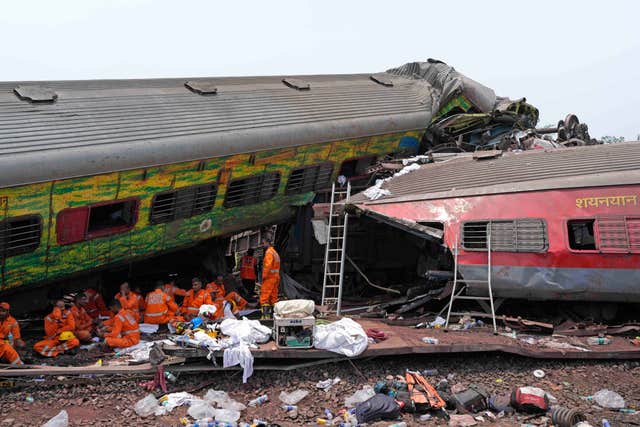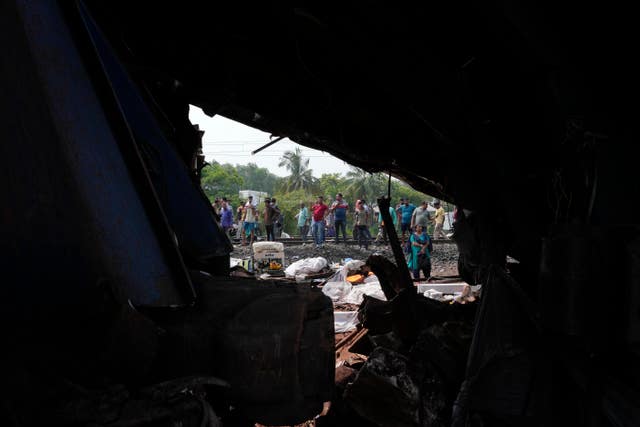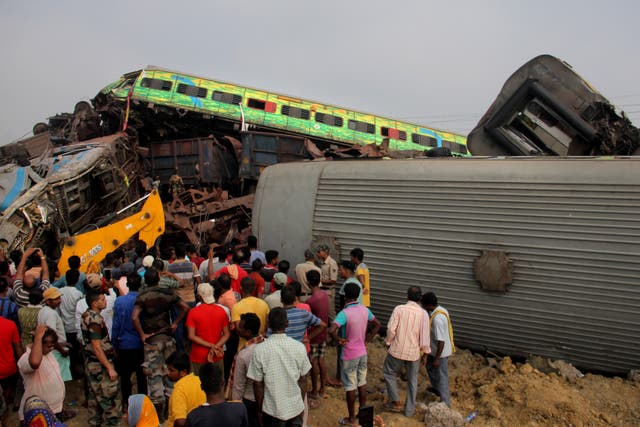
More than 280 people have been killed in eastern India in one of the country’s deadliest rail crashes in decades.
Rescuers found no more survivors in the wreckage of the two passenger trains that derailed in Odisha and injured hundreds of people.
There were chaotic scenes after the derailment on Friday night about 137 miles south-west of Kolkata, as rescuers climbed on top of the wrecked trains to break open doors and windows using cutting torches.
The death toll rose steadily throughout the night and the local emergency department confirmed that any survivors were rescued by 10pm.
Scotland's First Minister Humza Yousaf paid tribute to those killed in the tragedy.
He wrote on social media: "Just the most heartbreaking news from Odisha in India, hard to comprehend the scale of the tragedy.
"My sympathies and prayers to all of those mourning the loss of their loved ones and to our Indian community in Scotland who will be rocked by this tragedy."
 Rescuers rest in the shade of a passenger train that derailed in Balasore (AP)
Rescuers rest in the shade of a passenger train that derailed in Balasore (AP)
Army soldiers and air force helicopters joined the effort.
Sudhanshu Sarangi, director of Odisha state’s fire and emergency department, told The Associated Press: “By 10pm (on Friday, 5.30pm BST) we were able to rescue the survivors. After that it was about picking up dead bodies.
“This is very, very tragic. I have never seen anything like this in my career.”
At least 280 bodies were recovered overnight and into Saturday morning, he said. About 900 people were injured and the cause was under investigation.
In New Delhi, Prime Minister Narendra Modi met with officials and took stock of the tragedy before flying to Odisha for a first-hand look at the crash and to visit people being treated in hospitals.
Amitabh Sharma, a rail ministry spokesperson, said the rescue work was near completion.
 Hundreds of people were injured in the tragedy (AP)
Hundreds of people were injured in the tragedy (AP)
Rail authorities will start removing the wreckage to repair the track and resume train operations, he said.
About 200 of the severely injured people were transferred to specialty hospitals in other cities in Odisha, said PK Jena, the state’s top administrative official.
Another 200 were discharged after receiving medical care and the rest were being treated in local hospitals, he added. Scores of people also showed up to donate blood.
“The challenge now is identifying the bodies. Wherever the relatives are able to provide evidence, the bodies are handed over after autopsies. If not identified, maybe we have to go for a DNA test and other protocols,” he said.
Ten to 12 coaches of one train derailed, and debris from some of the mangled coaches fell onto a nearby track, according to Mr Sharma.
 An investigation is under way into the cause of the crash (AP)
An investigation is under way into the cause of the crash (AP)
The debris was hit by another passenger train coming from the opposite direction, causing up to three coaches of the second train to also derail, he added.
A third train carrying freight was also involved, the Press Trust of India (PTI) reported, but there was no immediate confirmation of that from rail authorities.
PTI said some of the derailed passenger coaches hit cars from the freight train.
The rescue operation was slowed because two train cars were pressed together by the impact of the accident, Mr Jena said.
Officials said 1,200 rescuers worked with 115 ambulances, 50 buses and 45 mobile health units through the night. Saturday was declared as a day of mourning in Odisha.
In August 1995, two trains collided near New Delhi, killing 358 people in one of the worst train accidents in India.
In 2016, a passenger train slid off the tracks between the cities of Indore and Patna, killing 146 people.
Most train accidents are blamed on human error or outdated signalling equipment.


Why are you making commenting on The Herald only available to subscribers?
It should have been a safe space for informed debate, somewhere for readers to discuss issues around the biggest stories of the day, but all too often the below the line comments on most websites have become bogged down by off-topic discussions and abuse.
heraldscotland.com is tackling this problem by allowing only subscribers to comment.
We are doing this to improve the experience for our loyal readers and we believe it will reduce the ability of trolls and troublemakers, who occasionally find their way onto our site, to abuse our journalists and readers. We also hope it will help the comments section fulfil its promise as a part of Scotland's conversation with itself.
We are lucky at The Herald. We are read by an informed, educated readership who can add their knowledge and insights to our stories.
That is invaluable.
We are making the subscriber-only change to support our valued readers, who tell us they don't want the site cluttered up with irrelevant comments, untruths and abuse.
In the past, the journalist’s job was to collect and distribute information to the audience. Technology means that readers can shape a discussion. We look forward to hearing from you on heraldscotland.com
Comments & Moderation
Readers’ comments: You are personally liable for the content of any comments you upload to this website, so please act responsibly. We do not pre-moderate or monitor readers’ comments appearing on our websites, but we do post-moderate in response to complaints we receive or otherwise when a potential problem comes to our attention. You can make a complaint by using the ‘report this post’ link . We may then apply our discretion under the user terms to amend or delete comments.
Post moderation is undertaken full-time 9am-6pm on weekdays, and on a part-time basis outwith those hours.
Read the rules here